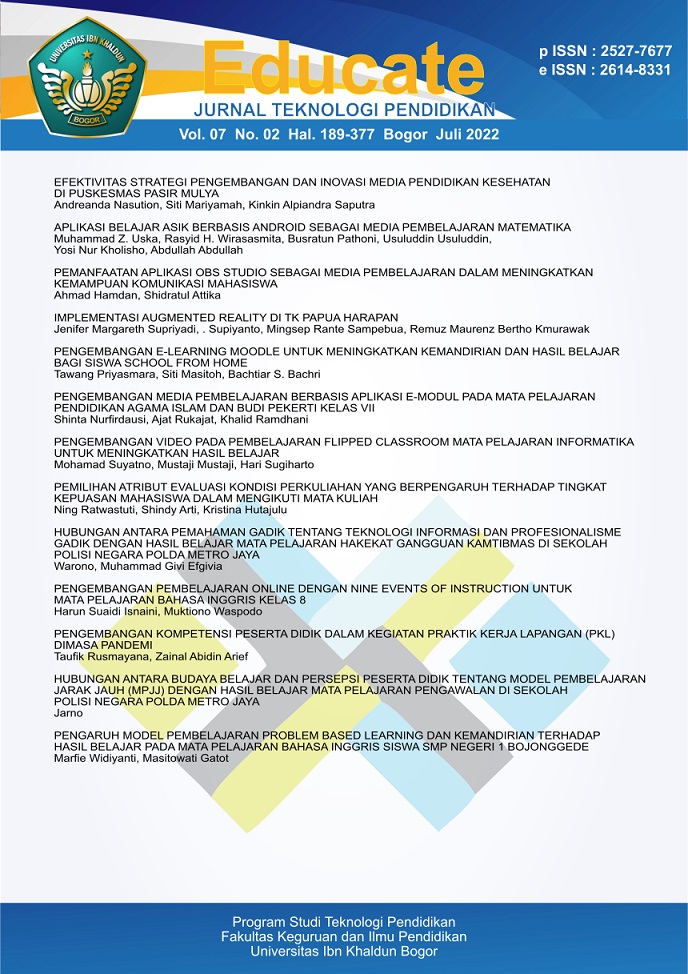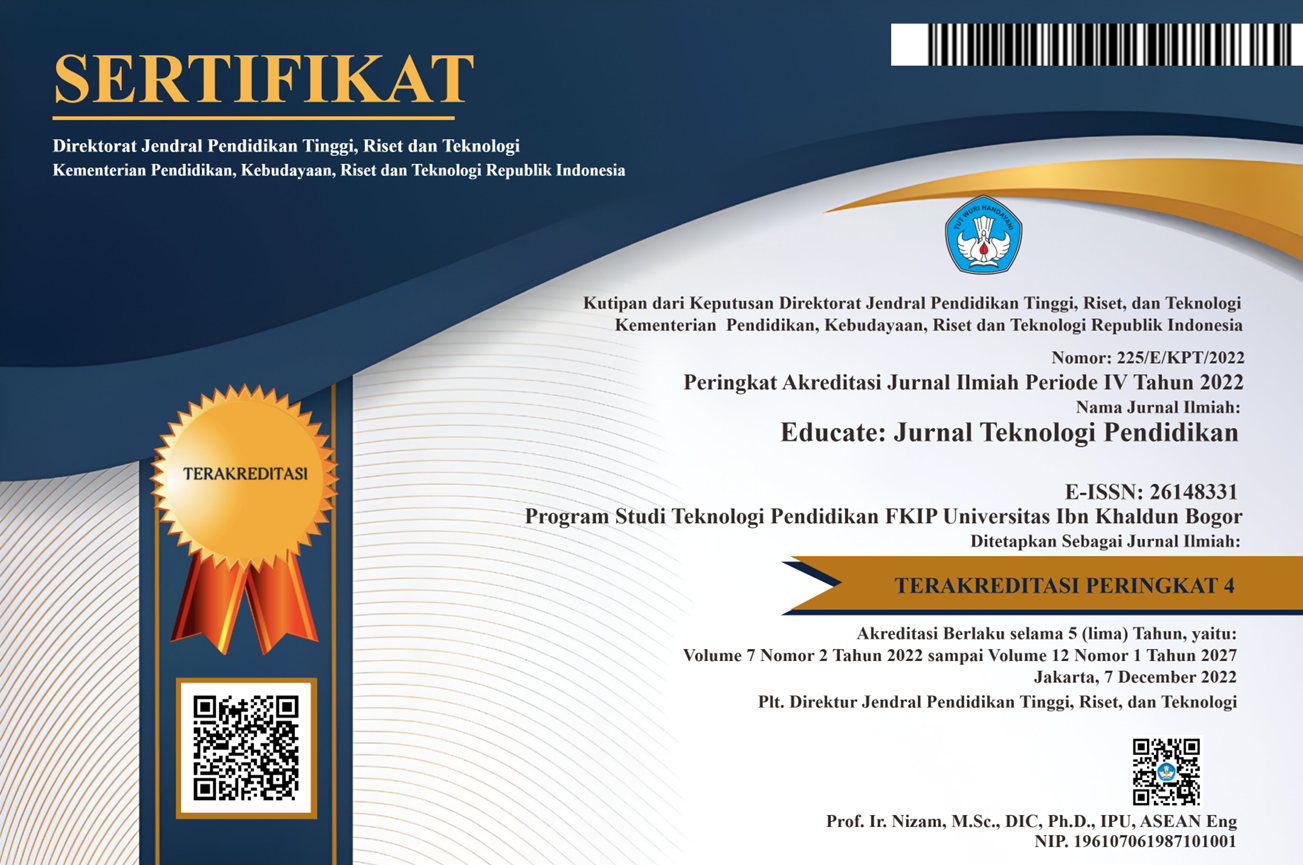PENGEMBANGAN INSTRUMEN PENILAIAN RANAH AFEKTIF PEMBELAJARAN PENDIDIKAN AGAMA BUDDHA
DOI:
https://doi.org/10.32832/educate.v7i2.13858Keywords:
Instrumen, pembelajaran, Penilaian, AfektifAbstract
Evaluasi merupakan bagian proses pembelajaran yang dilakukan secara menyeluruh, berkala dan berkesinambungan. Hasil observasi pelaksanaan mata pelajaran Pendidikan Agama Buddha menunjukkan evaluasi dilakukan dengan tes, terbatas penilaian domain kognitif. Penilaian afektif menggunakan tugas dan pengamatan. Penilaian afektif memerlukan instrumen yang tepat dan berkualitas. Jenis penelitian ini adalah Research and Development (R & D). Subjek penelitian peserta didik beragama Buddha dipilih secara acak, uji kelayakan dan kualitas instrumen divalidasi tim ahli, validasi guru, dan hasil pelaksanaan uji coba. Pengambilan data menggunakan metode dokumentasi, dan kuesioner. Olah data dengan uji t, uji validitas dan reliabilitas. Draf awal 60 butir pernyataan dikembangkan menggunakan skala likert. Hasil validasi dosen sebesar 76% dan guru 82% pernyataan sudah sesuai dengan aspek yang ditelaah dengan kriteria layak. Analisis hasil uji coba kelompok kecil 51 (85%) butir pernyataan memiliki daya beda 38 (63%) butir pernyataan valid dan reliabilitas instrumen r11= 0,614 > rtabel=0,576. Berdasarkan analisis uji coba, instrumen diperbaiki dan disusun kembali menjadi draf II. Hasil analisis uji lapangan menunjukkan 52 (87%) butir pernyataan memiliki daya beda baik. Hasil uji validitas 52 (87%) butir pernyataan valid dan hasil penghitungan reliabilitas yaitu r11=1,00 > rtabel=0,244, sehingga instrumen tersebut reliabel. Berdasarkan hasil analisis uji lapangan ini disusun produk akhir instrumen penilaian domain afektif.
References
Am, Z. (2018). Teknik penilaian hasil pembelajaran. Rausyan Fikr, 14(2), 53–62.
Baharom, S., Khoiry, M. A., Hamid, R., Mutalib, A. A., & Hamzah, N. (2015). Assessment of psychomotor domain in a problem-based concrete labrotary. Journal of Engineering Science and Technology, 10(Spec. Issue 1 on UKM Teaching and Learning Congress 2013, June 2015), 1–10.
Böttcher-Oschmann, F., GroíŸ Ophoff, J., & Thiel, F. (2019). Validation of a questionnaire to assess university students' research competences via self-evaluation – An instrument for evaluating research-oriented teaching and learning arrangements. Unterrichtswissenschaft, 47(4), 495–521. https://doi.org/10.1007/s42010-019-00053-8
Boyd, D. J., Grossman, P. L., Lankford, H., Loeb, S., & Wyckoff, J. (2009). Teacher preparation and student achievement. Educational Evaluation and Policy Analysis, 31(4), 416–440. https://doi.org/10.3102/0162373709353129
í‡elik, H. C. (2018). The effects of activity based learning on sixth grade students' achievement and attitudes towards mathematics activities. Eurasia Journal of Mathematics, Science and Technology Education, 14(5), 1963–1977. https://doi.org/10.29333/ejmste/85807
Churchland, P. S. (2018). Braintrust: What neuroscience tells us about morality. Braintrust: What Neuroscience Tells Us about Morality, 2012, 1–273. https://doi.org/10.5964/ejop.v14i2.1589
Criscione-Schreiber, L. G., Bolster, M. B., Jonas, B. L., & O'Rourke, K. S. (2013). Competency-based goals, objectives, and linked evaluations for rheumatology training programs: A standardized template of learning activities from the carolinas fellows collaborative. Arthritis Care and Research, 65(6), 846–853. https://doi.org/10.1002/acr.21933
Didion, L. A., Toste, J. R., & Wehby, J. H. (2020). Response Cards to Increase Engagement and Active Participation of Middle School Students With EBD. Remedial and Special Education, 41(2), 111–123. https://doi.org/10.1177/0741932518800807
Droege, M., & Assa-Eley, M. T. (2005). Pharmacists as care providers: Personal attributes of recent pharmacy graduates. American Journal of Pharmaceutical Education, 69(3), 290–295. https://doi.org/10.5688/aj690344
Edelglass, W. (2013). Buddhist Ethics and Western Moral Philosophy. A Companion to Buddhist Philosophy, April, 476–490. https://doi.org/10.1002/9781118324004.ch31
Ekawati, H., Wahyuni, W., & Sari, N. R. (2021). Penerapan Taksonomi Bloom Dan Krathwohl'S Pada Aplikasi Rubrik Penilaian Hasil Belajar Siswa Di Samarinda Untuk Aspek Afektif. Jurnal Ilmiah Matrik, 23(2), 189–200. https://doi.org/10.33557/jurnalmatrik.v23i2.1428
Fete, M. G., Haight, R. C., Clapp, P., & McCollum, M. (2017). Peer evaluation instrument development, administration, and assessment in a team-based learning curriculum. American Journal of Pharmaceutical Education, 81(4). https://doi.org/10.5688/ajpe81468
Fidalgo-Blanco, í., Sein-Echaluce, M. L., García-Peñalvo, F. J., & Conde, M. í. (2015). Using Learning Analytics to improve teamwork assessment. Computers in Human Behavior, 47, 149–156. https://doi.org/10.1016/j.chb.2014.11.050
Harris, M. (1976). History and Significance of the EMIC/ETIC Distinction. Annual Review of Anthropology, 5(1), 329–350. https://doi.org/10.1146/annurev.an.05.100176.001553
Heritage, M., & Wylie, C. (2018). Reaping the benefits of assessment for learning: achievement, identity, and equity. ZDM - Mathematics Education, 50(4), 729–741. https://doi.org/10.1007/s11858-018-0943-3
Hofmann, W., Wisneski, D. C., Brandt, M. J., & Skitka, L. J. (2014). Morality in everyday life. Science, 345(6202), 1340–1343. https://doi.org/10.1126/science.1251560
Imtihan, N., Zuchdi, D., & Istiyono, E. (2017). Analisis problematika penilaian afektif peserta didik madrasah aliyah. Schemata: Jurnal Pasca Sarjana, 6(1), 63–80.
Ismail, M., & Syaiful, L. (2016). Affective assessment in learning using fuzzy logic. 2015 IEEE Conference on e-Learning, e-Management and e-Services, IC3e 2015, July, 98–102. https://doi.org/10.1109/IC3e.2015.7403494
Jagger, S. (2013). Affective learning and the classroom debate. Innovations in Education and Teaching International, 50(1), 38–50. https://doi.org/10.1080/14703297.2012.746515
Jen, E. (2017). Affective Interventions for High-Ability Students From 1984-2015: A Review of Published Studies. Journal of Advanced Academics, 28(3), 225–247. https://doi.org/10.1177/1932202X17715305
Karst, K., & Bonefeld, M. (2020). Judgment accuracy of preservice teachers regarding student performance: The influence of attention allocation. Teaching and Teacher Education, 94, 103099. https://doi.org/10.1016/j.tate.2020.103099
Kitchen, E., Reeve, S., Bell, J. D., Sudweeks, R. R., & Bradshaw, W. S. (2007). The development and application of affective assessment in an upper-level cell biology course. Journal of Research in Science Teaching, 44(8), 1057–1087. https://doi.org/10.1002/tea.20188
Komalasari, K., & Sapriya, J. (2016). Living values education in teaching materials to develop students' civic disposition. New Educational Review, 44(2), 107–121. https://doi.org/10.15804/tner.2016.44.2.09
Krathwohl, D. R., Bloom, B. S., & Masia, B. B. (1969). Taxonomy of educational objectives: The classification of educational goals; Handbook. XXV(3), 895–897.
Lin, S., Luo, W., Tong, F., Irby, B. J., Alecio, R. L., Rodriguez, L., & Chapa, S. (2020). Data-based student learning objectives for teacher evaluation. Cogent Education, 7(1). https://doi.org/10.1080/2331186X.2020.1713427
Logan, C. S., & Ellett, C. D. (1988). The development, validity, and reliability of a faculty evaluation instrument to measure generic teaching skills and perceived enhancement of student learning. Journal of Personnel Evaluation in Education, 2(1), 65–82. https://doi.org/10.1007/BF00124968
Maulina, D. N., Slamet, S. Y., & Indriayu, M. (2018). Assessment of Affiliated Social Attitudes Based on Peer and Self Assessment Techniques in Curriculum 2013 for Elementary School Participants. Social, Humanities, and Educational Studies (SHEs): Conference Series, 1(1), 211–217. https://doi.org/10.20961/shes.v1i1.23770
Membrillo-Hernandez, J., & Garcia-Garcia, R. (2020). Challenge-Based Learning (CBL) in engineering: Which evaluation instruments are best suited to evaluate CBL experiences? IEEE Global Engineering Education Conference, EDUCON, 2020-April, 885–893. https://doi.org/10.1109/EDUCON45650.2020.9125364
Morgan, J. (2013). Buddhism and Autonomy-Facilitating.
Nafiati, D. A. (2021). Revisi taksonomi Bloom: Kognitif, afektif, dan psikomotorik. Humanika, 21(2), 151–172. https://doi.org/10.21831/hum.v21i2.29252
Noor, N. A. M., Saim, N. M., Alias, R., & Rosli, S. H. (2020). Students' performance on cognitive, psychomotor and affective domain in the course outcome for embedded course. Universal Journal of Educational Research, 8(8), 3469–3474. https://doi.org/10.13189/ujer.2020.080821
Oakland, T. (1997). Affective assessment. Psicologia Escolar e Educacional, 1(2–3), 11–21. https://doi.org/10.1590/s1413-85571997000100002
Pajrin, N. A. S., Asyafah, A., & Anwar, S. (2019). Studi Prosedur Penilaian Domain Afektif Oleh Guru PAI Di Smp Negeri 2 Bandung Dan Smp Salman Al-Farisi Bandung. TARBAWY : Indonesian Journal of Islamic Education, 6(2), 157–175. https://doi.org/10.17509/t.v6i2.19695
Quinn, R. A., Houts, A. C., & Graesser, A. C. (1994). Naturalistic Conceptions of Morality: A Question"Answering Approach. Journal of Personality, 62(2), 239–262. https://doi.org/10.1111/j.1467-6494.1994.tb00293.x
Robinson-Morris, D. W. (2019). Radical Love, (R)evolutionary Becoming: Creating an Ethic of Love in the Realm of Education Through Buddhism and Ubuntu. Urban Review, 51(1), 26–45. https://doi.org/10.1007/s11256-018-0479-4
Romesh, K. (2018). Moral Elements in the Ethical Code of Buddhism. Filozofia Publiczna i Edukacja Demokratyczna, 3(2), 18–35. https://doi.org/10.14746/fped.2014.3.2.14
Saeeda Lubaba, & AKM Shahed. (2017). Morality and Its Universal Approach From the Perspectives of Four Key Religions: Hinduism, Buddhism Christianity and Islam. Society & Change, XI, 50–63.
Saftari, M., & Fajriah, N. (2019). Penilaian Ranah Afektif Dalam Bentuk Penilaian Skala Sikap Untuk Menilai Hasil Belajar. Edutainment : Jurnal Ilmu Pendidikan dan Kependidikan, 7(1), 71–81. https://doi.org/10.35438/e.v7i1.164
Satria, I. (2018). Penilaian Sikap Afektif Sebagai Alternatif Dalam Penilaian Mata Pelajaran Ilmu Sosial. At-Ta'lim : Media Informasi Pendidikan Islam, 17(1), 55. https://doi.org/10.29300/attalim.v17i1.1180
Schein, C., & Gray, K. (2018). The Theory of Dyadic Morality: Reinventing Moral Judgment by Redefining Harm. Personality and Social Psychology Review, 22(1), 32–70. https://doi.org/10.1177/1088868317698288
Schwartz, S. (2013). Value Priorities and Behavior: Applying a Theory of Integrated Value Systems Shalom Schwartz. The Psychology of Values: The Ontario Symposium, 8(May), 1–24.
Slaby, J. (2012). Affective self-construal and the sense of ability. Emotion Review, 4(2), 151–156. https://doi.org/10.1177/1754073911430136
Sukanti, S. (2011). Penilaian Afektif Dalam Pembelajaran Akuntansi. Jurnal Pendidikan Akuntansi Indonesia, 9(1), 74–82. https://doi.org/10.21831/jpai.v9i1.960
Syamsudin, A., Budiyono, B., & Sutrisno, S. (2016). Model of affective assessment of primary school students. Research and Evaluation in Education, 2(1), 25. https://doi.org/10.21831/reid.v2i1.8307
Ten Cate, T. J., & De Haes, J. C. J. M. (2000). Summative assessment of medical students in the affective domain. Medical Teacher, 22(1), 40–43. https://doi.org/10.1080/01421590078805
Utami, N. P. (2018). Implementasi Penilaian Ranah Afektif Di Sd Negeri 9 Boyolali. Pendidikan Guru Sekolah Dasar, 22(7), 81–92. http://journal.student.uny.ac.id/ojs/index.php/pgsd/article/view/11793/11348
Watling, C. J., & Ginsburg, S. (2019). Assessment, feedback and the alchemy of learning. Medical Education, 53(1), 76–85. https://doi.org/10.1111/medu.13645
Widiyawati, D., Putri, C. D., & Walid, A. (2021). Evaluasi Pembelajaran dan Pengaruhnya Terhadap Minat Belajar Siswa pada Mata Pembelajaran IPA Kelas IX di SMPN 3 Tanjung Sakti Pumi Lahat Sumatra Selatan. Jurnal PTK dan Pendidikan, 6(2). https://doi.org/10.18592/ptk.v6i2.4227
Wong, S. L. (2020). Affective characteristics for 21st century learning environments: Do they matter? International Journal of Interactive Mobile Technologies, 14(12), 186–194. https://doi.org/10.3991/IJIM.V14I12.15567
Yunita, L., Agung, S., & Noviyanti, Y. (2017). Penerapan Instrumen Penilaian Ranah Afektif Siswa Pada Praktikum Kimia di Sekolah. Prosiding Seminar Nasional Pendidikan FKIP UNTIRTA, 1(2), 107–114. https://jurnal.untirta.ac.id/index.php/psnp/article/view/107-114
Zakiah, Z., & Khairi, F. (2019). Pengaruh Kemampuan Kognitif Terhadap Prestasi Belajar Matematika Siswa Kelas V Sdn Gugus 01 Kecamatan Selaparang. El Midad, 11(1), 85–100. https://doi.org/10.20414/elmidad.v11i1.1906
Downloads
Published
How to Cite
Issue
Section
License
| Authors grant the journal copyright of the work licensed under CC-BY-SA or The Creative Commons Attribution–ShareAlike License that allows others to share the work with an acknowledgement of the work's authorship and initial publication in this journal. | Penulis memberikan hak cipta karyanya kepada jurnal yang dilisensikan dengan CC-BY-SA or The Creative Commons Attribution–ShareAlike License yang memungkinkan orang lain untuk menggunakan karya dengan pengakuan kepengarangan karya dan publikasi awal dalam jurnal ini. |










